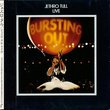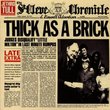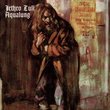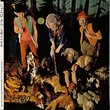| All Artists: Jethro Tull Title: Stand Up (Mlps) Members Wishing: 4 Total Copies: 0 Label: Toshiba EMI Japan Original Release Date: 1/1/2003 Re-Release Date: 6/30/2003 Album Type: Import, Limited Edition, Original recording remastered Genres: Pop, Rock, Classic Rock, Metal Styles: Blues Rock, Progressive, Progressive Rock, Album-Oriented Rock (AOR) Number of Discs: 1 SwapaCD Credits: 1 |
Search - Jethro Tull :: Stand Up (Mlps)
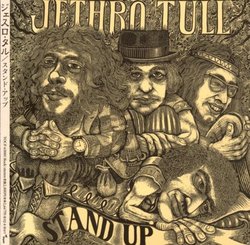 | Jethro Tull Stand Up (Mlps) Genres: Pop, Rock, Classic Rock, Metal
|
Larger Image |
CD DetailsSimilar CDs
|
CD ReviewsTull's Finest Hour Jolph | Wadhurst | 12/19/2002 (5 out of 5 stars) "Stand up was recorded in early 1969 and released on 25th July of the same year. `Even if we'd used a brown paper bag for a cover this would still be one of the finest albums Island has ever released' ran the ads in the British music press. And the cover does the music justice, a wonderful woodcut by New York artist Jimmy Grashow. The original LP had a `pop up' of the band that `stood up' when the gatefold seeve was opened. `Stand Up' is very much a product of its time. British rock music was gliding into a period when it dominated world music. This was the time when Led Zeppelin recorded their first albums, Yes likewise. A track from `Stand Up' (We Used to Know) featured on the Island records sampler `Nice Enough to Eat' - and what a sampler it was; Traffic, King Crimson, Nick Drake, Fairport Convention, Blodwyn Pig, Mott the Hoople and Free. Stand Up was Jethro Tull's second album. Their original guitarist Mick Abrahams had quit the group late the previous year and was replaced by Martin Barre (after a brief interregnum by an ill suited Tony Iommi, later of Black Sabbath - pronounced Sabbaff by true fans). Free of Abrahams influence Ian Anderson, flautist, songwriter and frontman, had free rein for the first time and Tull explored the woody, folky, rootsy edges of their music for the first time. There are umpteen wonderful moments on the album from the opening heavy bluesy riff on A New Day Yesterday (in retrospect a farewell to the blues influences that littered their first album `This Was' ) to the flutey progressive For a Thousand Mothers'. Many will know Bouree, Tull's flute lead interpretation of Bach's piece, but the album scores because it has strength in depth. Anderson's use of the mandolin on Jeffrey Goes to Leicester Square is both wistful and enchanting, but my personal favourite is `Fat Man'. Why? It is my desert island track - that piece of music I'd take with me to warm my soul wherever I may find myself. The breathiness of the flute, the rattling mandolin and tambourine, bowled along with a bongo beat; it is alive and full of energy - I've used the phrase joi de vivre to describe Tull's first album in a separate review - but this track encapsulates that feeling. It's the musical embodiment of the feeling of running down a hill on a warm summers day with the grass at one's feet and the wind in ones hair. So, should you buy this album? Though many, especially in the US, will be more familiar with Aqualung and Thick as a Brick, Stand Up captures a lighter, more innocent Tull, still full of vitality, not yet descended into self parody. This is pure and unalloyed Tull, so very British (I hesitate to say English because Anderson plays up his Scottishness) and so very likeable. Unless you are an out and out rocker, or completely in thrall to the notion of rock musicians as impresarios (c.f. Rick Wakeman) then this is the must have Tull album. Habup, Jolph" An absolute classic B. Keagle | MA | 10/25/2005 (5 out of 5 stars) "A previous reviewer wrote that "Fat Man" would be his Desert Island song. Personally, I'd take the whole album. Stand Up is an absolute classic. Most bands "peak" with a certain album and it's all downhill from there. JT is unique in that they had several peaks over the very long life of the band, and this is one of them. It's hard to compare this album with anything else except perhaps Benefit, which I'd also rate 5 stars - another peak." An Incredible Remaster D. A. Rich | Boston, MA | 09/27/2009 (5 out of 5 stars) "Stand Up, originally released in 1969, was Jethro Tull's second album and its first with core member Martin Barre (lead guitar) joining founder and fellow core member Ian Anderson (songwriter, flute, acoustic guitar and vocals). This outstanding album features a unique blend of British folk, hard rock and jazz and was the first in a series of classic Tull albums, closely followed by Benefit (1970), Aqualung (1971), Thick As A Brick (1972) and Living in the Past (1972).
The songs on Stand Up rank among Tull's very best. Highlights include the blues-rock influenced "A New Day Yesterday," the J.S. Bach inspired (or stolen) "Bouree" and the ballad "Things We Used To Know." The songs from the original album are supplemented with four "bonus" tracks (the first three of which also appear on Living In The Past and are among the highlights of that release). The bonus tracks fit in with the sound and overall musical feel of the remainder of the album and do not detract from it, as is often the case. Moreover, Stand Up has probably never sounded better than it does on this fine remastered Japanese offering. The music is rich and warm, and incredibly detailed, with each instrument and the vocals well-defined. It is a joy to listen to. As with other Japanese "mini-LPs" the artwork of the intricate original LP cover, which features a print from a woodcut depicting the band members, is recreated on hard cardboard stock, and the original "pop-up" of the band members in the gatefold has been faithfully recreated. Finally, at the time of this writing, this import CD is being offered at a very reasonable price by Amazon as well as by its marketplace vendors. All of this begs the question: why aren't more classic cds remastered, packaged and priced the way this one has been? For anyone who enjoys Tull's music -- or classic rock in general -- this is a must purchase. Very highly recommended. " |

 Track Listings (14) - Disc #1
Track Listings (14) - Disc #1